English CBSE Class 12 NCERT Flamingo Chapter 3 Deep Water Free Solution of Extra Questions and Answers – Extract Based Questions Short Answer Questions Long Answer Questions and Value Based Questions
DEEP WATER
(Extra Questions)
Multiple Choice Questions
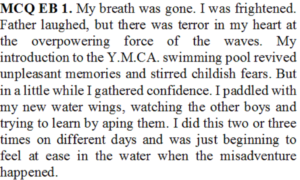

(i) ‘Father laughed, but there was terror in my heart’. What could possibly have been emotions of father at that instant?
(a) anger
(b) disgust
(c) mocking
(c) pity
(ii) What was the ‘childish fear’ of narrator?
(a) his father may laugh at him
(b) he may get drowned in water
(c) he may overpower force of water
(d) he may swim in water
Answer: (b)
(iii) Which word in the extract is synonym of ‘imitating’?
(a) watching
(b) overpowering
(c) trying
(d) aping
(iv) To gain confidence which of the following activity was not done by the narrator?
(a) paddling in water with new water wings
(b) observing other boys in the pool
(c) trying to learn by watching other boys
(d) reviving earlier memories
(iv) Which of the following had not happened to the narrator during the previous unpleasant incident?
(a) His breath was gone
(b) There was terror in his heart
(c) His father was frightened
(d) He was overpowered by waves
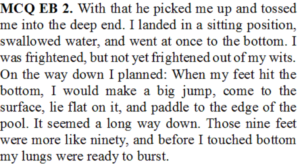

(i) “Those nine feet were more like ninety”. What does the narrator imply by this line.
(a) When you multiply by ten, nine becomes ninety
(b) Ninety is much more than nine
(c) The pool was too deep to him
(d) The time taken to travel the nine feet was more than he had expected
(ii) Which of the following words, as used in the extract, is synonym to ‘threw’?
(a) picked
(b) swallowed
(c) tossed
(d) frightened
(iii) Which of the following action was not planned by the narrator?
(a) My feet would hit the bottom
(b) I would make a big jump
(c) I would lie flat on water surface
(d) I would paddle to the edge of the pool
(iv) A phrase ‘went at once to the bottom’ has been used in the extract. Which of the following is not the correct use of ‘at once’?
(a) Jumped at once to the opposite side
(b) Ate at once to my satisfaction
(c) Travelled at once to Germany
(d) Pressed accelerator at once to stop the vehicle
(v) In your opinion why lungs of the narrator were ready to burst?
(a) He had swallowed air
(b) He was strong
(c) He had made good preparations
(d) He was not able to breathe
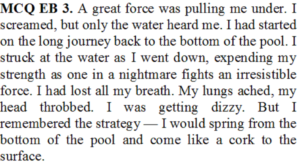

(i) What was the narrator going back to the bottom of the pool?
(a) Because he loved the journey
(b) Because of his weight
(c) Because of attraction of water
(d) Because of push from the sky
(ii) While going down, which of the following was not experienced by the narrator?
(a) Struck at the water
(b) Lungs ached
(c) Head throbbed
(d) Getting dizzy
(iii) Which of the following words, as used in the extract is synonymous to ‘jump’?
(a) force
(b) cork
(c) spring
(d) surface
(iv) Even during the dreadful situation, the narrator remembered his
(a) strength
(b) weakness
(c) plan
(d) duty
(v) Who had heard the screams of the narrator?
(a) The big boy
(b) The other swimmers
(c) The water
(d) Nobody
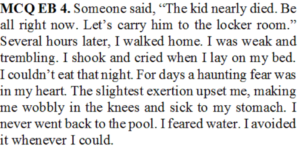

(i) Who is being referred to as ‘kid’ in above extract?
(a) The coach
(b) The bruiser boy
(c) The narrator
(d) The swimmer
(ii) Which of the following feeling did not occur to narrator for days after reaching home?
(a) physical weakness
(b) haunting fear
(c) sick to stomach
(d) good appetite
(iii) What did the narrator avoid whenever he could?
1. drinking water
2. swimming in pool
3. bathing with water
4. getting into a river
(a) 1 and 4
(b) 2 and 3
(c)3 and 4
(d) 2 and 4
(iv) Which word as used in the extract cannot be associated to the word ‘shaking’?
(a) trembling
(b) wobbly
(c) haunting
(d) All the above
(v) Which of the following activity the narrator could not do ‘that night’?
(a) crying
(b) fearing
(c) trembling
(d) eating
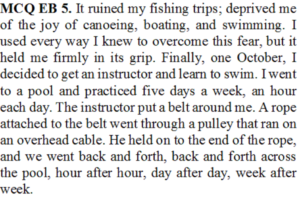

(i) Which of the following activities was enjoyed by the narrator because of his fear
(a) canoeing
(b) boating
(c) swimming
(d) none of above
(ii) How many hours in a week did the narrator practice?
(a) seven
(b) six
(c) five
(d) day after day
(iii) Arrangement of rope and pulley during practice indicates the instructor was –
(a) innoxious
(b) innocent
(c) innovative
(d) innocuous
(iv) The narrator continued to practice for many weeks. Which quality is indicated by his sustained efforts?
(a) perseverance
(b) adolescence
(c) essence
(d) negligence
(v) What according to you was the main purpose of rope and pulley arrangement?
(a) prevent narrator from swimming
(b) prevent narrator from learning
(c) prevent narrator from drowning
(d) prevent narrator from frowning
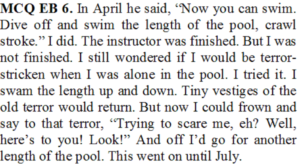

(i) In which month the instructor completed training the narrator?
(a) October
(b) July
(c) April
(d) None of above
(ii) How did the author check if he had learnt swimming?
(a) Diving off into the pool
(b) Swimming crawl stroke
(c) Swimming alone in the pool
(d) Swimming along length of the pool
(iii) Which of the following words spoken by the narrator is not an indication of his confidence?
(a) Trying to scare me, eh?
(b) Now you can swim
(c) Well, here’s to you!
(d) None of above
(iv) Which word as used in the extract implies ‘had a doubt’?
(a) said
(b) wondered
(c) finished
(d) swam
(v) A phrase ‘terror-stricken’ has been used in the extract. Which of the following is not the correct use is word ‘stricken’?
(a) poverty-stricken
(b) calamity-stricken
(c) grief-stricken
(d) drive-stricken
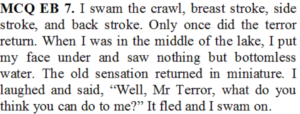

(i) According to the extract, which of the following swimming style was not practiced by the narrator?
(a) side
(b) back
(c) front
(d) crawl
(ii) According to extract, how many times did the terror return to the narrator?
(a) Once
(b) Thrice
(c) Four times
(d) Twice
(iii) Which of the following is not true about the narrator?
1. He was an expert swimmer
2. He wanted to overcome his fear
3. He tried several styles of swimming to gain confidence
4. He believed in challenging himself
5. He trusted cold water lakes
(a) 1 and 3
(b) 1 and 2
(c) 1 and 5
(d) 1 and 4
(iv) What did the narrator do to run away the miniature terror?
(a) accepted it
(b) challenged it
(c) ignored it
(d) requested it
(v) Which word as used in the extract is antonym to ‘giant’?
(a) terror
(b) crawl
(c) miniature
(d) under
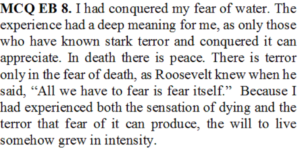

(i) What ‘experience’ the narrator is referring to in above extract?
(a) experience of swimming
(b) experience of terror
(c) experience of life
(d) experience of overcoming fear
(ii) According to extract who can appreciate the meaning of such an experience?
(a) one who has known great terror
(b) one who has overcome terror
(c) either (a) or (b)
(d) Both (a) and (b)
(iii) Which of the following word as used in the extract is synonym to ‘desire’?
(a) stark
(b) appreciate
(c) will
(d) grew
(iv) According to the extract, the actual fear is
(a) fear of death
(b) death itself
(c) fear itself
(d) both (a) and (c)
(v) Why do you think the author has quoted the saying of Roosevelt?
(a) to keep the promise he had made to Roosevelt
(b) to support his own thoughts
(c) to support thoughts of Roosevelt
(d) to negate thoughts of Roosevelt
Extract Based Questions


(i) What does the word ‘it’ refer to?
(ii) What was name of river that flowed near Yakima town?
(iii) Which word in the extract is synonym of ‘provided’?
(iv) In above extract to whom does the word ‘I’ refer to ?


1. In above abstract to whom does ‘he’ refer to?
2. In reference to above extract, where had ‘he’ and ‘I’ gone to?
3. What did ‘he’ do when ‘I’ was buried under water?
4. What was the age of ‘I’, when the incident mentioned in the extract happened?


1. Which word in the extract is synonym of ‘afraid’?
2. Why was water still?
3. What was the name of the pool?
4. In above extract who is referred as ‘I’?


1. Who is referred to as ‘he’ in above extract?
2. What was age of ‘he’?
3. Which word in the extract is synonym of ‘strong’?
4. Who is referred as ‘you’ in above extract?


1. Why did the narrator summon all his strength?
2. Where was the author while make above statement?
3. Which word in the extract is synonym of ‘jump’?
4. What is the distance narrator had to travel to come to the surface?


1. Why did all the efforts ceased?
2. Was the narrator eventually saved?
3. Which word in the extract is synonym of ‘removed’?
4. How many downward journeys had narrator made?


1. Who is referred as ‘he’ in above extract?
2. Who was built as a swimmer?
3. Which word in the extract is synonym of ‘complete’?
4. Did the narrator became confident immediately after learning swimming?
Short Answer Questions – 30 to 40 words


Answer: Douglas was frightened. He swallowed water and went down in the pool. He jumped from the bottom of the pool and wanted to paddle to the side of the pool. But he could not swim to the side of the pool.
Finally, his lungs suffocated, his head started throbbing. He became unconscious.


Answer: Douglas struck at the water as he went down. He had lost his breath, his lungs were aching and head was throbbing. He became stiff and rigid due to fear. His heart beat and throbbing in his head told that he was still alive.
When he reached bottom, he jumped with all is strength to come to surface once again.


Answer: He became fearful of water. He could not dare to go to water for many years. Whenever he went near a water body, the haunting fear would grip him, He could not enjoy any water-sports activity, be it fishing or boating.


Answer: Through an instructor Douglas learnt to swim on his own in a pool.
Still some residual fears had remained. Douglas went to Lake Wentworth and then to Warm Lake. He swam like a professional swimmer. Now all the residual fear had gone.


Answer: Douglas learnt swimming through an instructor. Now he could swim on his own in a pool. Still some residual fears had remained. Douglas went to Lake Wentworth and then to Warm Lake. He swam like a professional swimmer. Now all the fear had gone.
After this he made the above statement.


Answer: Douglas considered the fear of water a handicap in his life.
He could not enjoy boating and fishing. To remove handicap of his life, he wanted to learn swimming.
He learnt to swim in a pool through an instructor. Still some residual fears had remained. Douglas went to Lake Wentworth and then to Warm Lake. He swam like a professional swimmer. Now all the fear had gone.


Answer: The Yakima River in the town was treacherous. His mother knew about some instances of drowning in the river. The YMCA pool was three feet deep at one end. It gradually increased to nine feet at the other end. The pool was considered safe hence Douglas decided to learn swimming at YMCA pool.


Answer: Douglas learnt that it was not good to sit alone at the edge of the pool. It is important to remain calm and keep trying even in difficult situations. He understood that every activity requires some time to master.


Answer: Douglas learnt swimming in a pool. His swimming expeditions outdoors removed every residual terror of water. Thus he conquered his fear. He understood that terror is only in the fear of death.
After this he had quoted the quote referred in the question.


Answer: When Douglas was about four years’ old, he had gone to a beach in California. A wave knocked him down and swept over him. He was buried in water and his breath was gone.
Since then he started having an aversion to water.


Answer: The childhood memory of getting knocked down by a wave made him a bit panicky. He started using his water wings to move across the pool. He tried to copy other boys. He did so two-three times on different days. After that he started feeling at ease.


Answer: Douglas was suddenly into very difficult situation. He was going down the water and he did not know swimming. He said above statement to himself because he had a strong desire to overcome the situation. It shows his fighting capability and his presence of mind to remain calm during crisis.


Answer: While Douglas was going down the water for the second time, he was full of fear. Even his screams were frozen. He felt paralysed under water. Under the extreme fear he recalled his strategy of jumping from the bottom of the pool to reach the surface.
In this context the above statement is made.


Answer: While Douglas was going down the water in the swimming pool for the third time, he tried to breathe but water got into his mouth. The yellowish light of water was fading. His legs felt limp and darkness swept over his mind. He became unconscious. Douglas thought that he was about to die.
To sum up such condition, Douglas made above statement.


Answer: Douglas was lying on his stomach near the pool. The boy was telling that he was only joking. Somebody was telling that the kid had nearly died. Douglas was carried to the locker room. From there he went to his home.


Answer: Douglas had developed a strong fear of water. He could not enjoy any water sport related activity like swimming, boating and fishing.
To enjoy these activities he decided to overcome his fear.


Answer: Douglas went to Lake Wentworth for swimming. When he was in the middle of the lake he put his face under water. It appeared to him that the lake did not have bottom i.e. it was very deep.
At that instant the old sensation returned in miniature.
Long Answer Questions – 120-150 words


Answer: Douglas wanted to overcome his fear of water. He hired an instructor to teach him swimming.
The coach used to give him training five days in a week for one hour every day. The coach put a belt around Douglas. A rope was tied to the belt and taken over the pulley. The coach held the other end of the rope. Now Douglas could not drown. Douglas went across the pool this way.
Then coach taught him how to exhale in water and to inhale keeping nose above water. Douglas learnt to use his legs. Initially his legs refused to work. But slowly he learnt the art.
Finally all learnings were integrated into a lesson and Douglas could now swim on his own.
Thus, through step by step process the instructor had taught swimming to Douglas. The statement means that the task of instructor was completed.
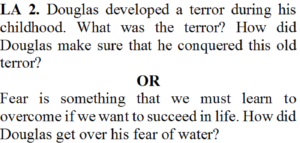

Answer: In his early childhood Douglas had gone to a beach in California. A wave knocked him and water swept over him. When he was about eleven, he went to YMCA pool to learn swimming. A bruiser boy threw him into the pool. He nearly drowned in the pool.
So he developed a strong fear of water. He could not enjoy any water sport related activity like boating and fishing.
To overcome his fear, Douglas hired an instructor to teach him swimming. The coach made a belt and pulley arrangement so that Douglas could not drown. Douglas went across the pool this way. Coach taught him to exhale in water and to inhale keeping nose above water. Douglas learnt to use his legs. Finally all learnings were integrated and Douglas could swim on his own in the pool.
But some residual terror still remained. So he went to Lake Wentworth and Warm Lake for swimming.
After this he felt that he had completely conquered his fear.
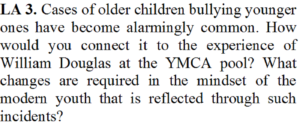

Answer: Our society is undergoing a strange change in behaviour pattern of kids. They appear to be self-centered. Their behaviour even to their younger siblings has turned from a mentor to an aggressor.
Bullying is intentional tormenting in physical or psychological ways. This can happen on one to one basis or through a group.
The affected kid tolerates the tantrums to some extent. When it breaches his patience he often joins the group. He feels proud to turn from a victim to victimiser. And the process continues.
Parents have greater role to play in stopping instances of bullying. If they notice their child getting bullied, they must speak to parent of the older child. In majority of the cases it works.
When parent receive a complaint about their child, they must advise their own child. If required, they should take help of teachers and a counsellor.
We should minimise exposure to social media. We should motivate kids to participate in team activities and family get-togethers. The family plays a great role for inculcating better values in kids.


Answer: In his early childhood Douglas had gone to a beach in California. A wave knocked him and water swept over him. When he was about eleven, he went to YMCA pool to learn swimming. In a misadventure he nearly drowned in the pool. So he developed a strong fear of water.
The fear stayed with him for a long time. He could not enjoy any water sport related activity like boating and fishing. When he went for landlocked salmon fishing or trout fishing, the fear of water would come back to him. Douglas writes that whenever he wanted to enjoy like cascades or take bath in a lake, the fear would grip him.
He considered the fear of water as a handicap in his life. Therefore he was determined to get over it. He learnt swimming in a pool. Then he went outdoors for swimming in lakes to overcome residual terror.
These instances indicate that he mustered enough courage to overcome his fear. He was a strong person indeed.


Answer:
No Pains No Gains
Hard work is the foundation of every success. One would need to train himself for long hours before making a successful attempt. The success in business, sports or study warrants sustained efforts. Those who avoid hard work end up being day dreamers.
Every sportsperson like PT Usha, Sachin Tendulkar, Milkha Singh, Dhyan Chand used to practice a lot. Businesspersons like Ratan Tata, Mukesh Ambani, Azim Premzi work diligently even today.
Destiny always supports those who work hard and systematically. Industrious people are able to climb the ladder of success.
Similar is the case with Douglas. When he did not make any attempt to overcome his fear, it stayed with him. When he started working systematically and put in hard work he overcame it. From October to July he took training at the swimming pool. Then he went to Lake Wentworth and Warm Lake to swim outdoors. Finally his hard work paid dividends he conquered his fear.
So “No Pains, No Gains” applies everywhere.


Answer:
Positive Attitude and Perseverance
Life is full of uncertainties and adversities. A positive attitude helps one to cope with adversities of life. It brings optimism to life. With positive attitude one can see the bright side of life and work for the best to happen.
Positive attitude, though an essential requirement, is not the sole attribute for success. The creativity and solutions arrived at must be followed and executed with vigour. It is said that every journey is completed through small steps taken regularly and in continuity.
The story of rabbit and tortoise is a classic example. While rabbit stopped its efforts midway, tortoise continued its journey though at a slow pace. Eventually tortoise was the winner.
Douglas developed fear of water. Quite late in life he realized that it was too much for him to live with fear. With a positive frame of mind he started getting trained. Then followed up with outdoor excursions. Finally he conquered his fear.
Thus being positive and through sustained efforts one can achieve anything in life.
****


0 Comments